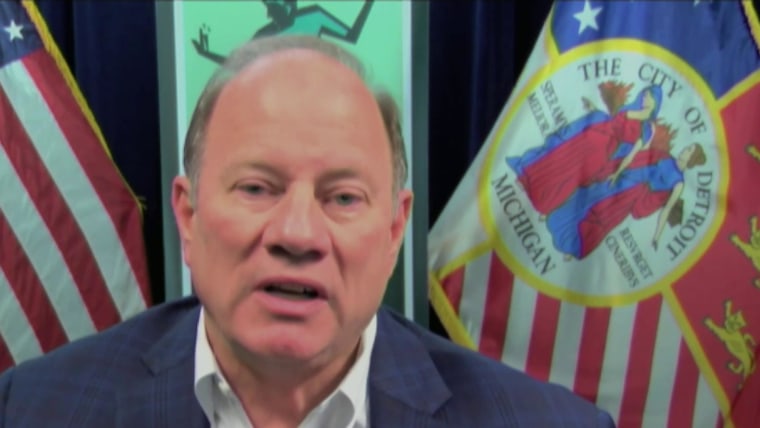WASHINGTON — In a bid to align his unity pitch with his pursuit of a bold agenda, President Joe Biden has been selling his $1.9 trillion Covid-19 package as bipartisan.
But that message crashed into a hard reality early Saturday morning when the House passed the bill — without a single Republican vote.
In recent weeks, Biden’s chief of staff Ron Klain has marshaled the White House messaging apparatus to make the case that the president's aid package is bipartisan, not because any GOP lawmakers have signed on, but because polls show it has support from a large majority of the public, and because some Republican mayors and officials outside Washington have backed it.
The bill now heads to the Senate, where it also lacks GOP support.
Klain has repeatedly cited polls in the face of criticism for pursuing a party-line approach.
White House digital director Rob Flaherty said Wednesday that the Covid plan is “extremely bipartisan,” citing a Morning Consult poll that showed 76 percent public support, including 60 percent of self-identified Republicans.
While Democrats can pass it without Republicans if they stick together, the dynamic points to a bigger struggle for Biden: The GOP “epiphany” he predicted shows no sign of materializing. and his agenda is likely to face the kind of full-fledged partisan opposition that bedeviled Barack Obama as president.
Asked at a recent CNN town hall how he will heal a divided nation, Biden cited polls that find significant support among Republican voters for his Covid-19 plan. He said they show the U.S. is “not nearly as divided as we make it out to be.”
But those pleas haven't moved Republican lawmakers. His task is complicated by the fact that large numbers of Republican voters falsely say he lost the 2020 election and, according to a recent Pew Research Center poll, want their leaders to stand up to him rather than cut deals.
“That's kind of an interesting approach to it,” former Senate Republican budget staffer Bill Hoagland said. “What they're saying is the Republicans that are here do not represent their constituents back home and therefore we should listen to the constituents.”
Hoagland, now at the Bipartisan Policy Center, said bipartisanship in Washington has historically meant winning votes from the other party. He said he has never seen it defined by polls during his 25 years working on Capitol Hill, calling Biden’s version “an interesting twist on the legislative and democratic process.”
But many progressives like the new approach, including those who were critical of Biden’s talk of unity.
“I think it’s super smart," said Adam Jentleson, a former aide to Senate Democratic leader Harry Reid. "If you let Mitch McConnell define what is bipartisan, nothing ever will be. Defining it based on public opinion is accurate and opens the door to doing big things,”
'You Can't Have It Both Ways'
The frustration has extended to Republicans on Capitol Hill who hoped that Biden would cut down his $1.9 trillion package to win their support, but those talks dissolved after Biden decided their $618 billion plan was too small to address the crisis.
“No matter how many times they tweet about it, unelected White House staffers can’t singlehandedly change the definition of ‘unity.’ At some point, just have the courage to admit what you’re doing: pushing a partisan bill through a partisan process,” said a Republican aide familiar with the bipartisan Covid-19 relief talks. “You can’t have it both ways.”
Matt Gorman, a GOP consultant and campaign operative, called Biden’s approach “too clever by half.”
As a candidate, Biden often waxed nostalgic about cross-party cooperation during his time in the Senate and said he'd be a president who works to revive that spirit. His tenure dates to the 1970s and 1980s, an era when the two parties each had a broad mix of liberals and conservatives in their ranks, which paved the way for bipartisan coalitions. That isn't the case today.
"President Biden promised unity, but Democrats are delivering one-party rule," House Minority Leader Kevin McCarthy, R-Calif., said before his entire caucus was joined by two Democrats in voting against the bill.
In his inaugural address last month, Biden used the word “unity” eight times and said, “We have never, ever, ever failed in America when we have acted together.”
On Feb. 2, Klain cited a Yahoo News/YouGov poll showing that more than two-thirds of Americans support the policies in his American Rescue Plan. "This IS a bipartisan agenda," he tweeted.
On Monday, Klain wrote that the plan "has bipartisan support among voters; state/local leaders; business & labor," and that it "should get the same in Congress."
At a recent meeting with labor leaders in the Oval Office, Biden said that “based on the polling data,” Americans “want everything that’s in the plan — not a joke.”
White House press secretary Jen Psaki has been peppered with questions from reporters in her daily briefings about whether Biden’s pledge to pursue a Covid-19 bill on a party-line vote breaks his promise of finding common ground.
“He didn’t run on a promise to unite the Democratic and Republican Party into one party in Washington,” Psaki said on Feb. 5. “This package has the vast majority of support from the American public.”
"news" - Google News
February 27, 2021 at 02:13PM
https://ift.tt/3bM4NQn
White House pitches Biden's Covid bill as bipartisan — without Republican votes - NBC News
"news" - Google News
https://ift.tt/2DACPId
https://ift.tt/2Wh3f9n
Bagikan Berita Ini
















0 Response to "White House pitches Biden's Covid bill as bipartisan — without Republican votes - NBC News"
Post a Comment